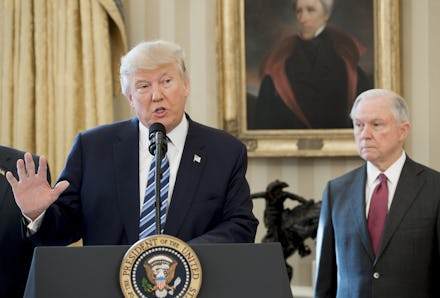This law is the one thing that the Trump era needs most, but Congress let it die in 1999

In the wake of revelations that Attorney General Jeff Sessions misled Congress about meeting with a Russian official during the presidential campaign, a group of 11 Senators are calling for a special prosecutor to investigate the Trump campaign's alleged tied to Russia.
Special prosecutors — attorneys from outside of the federal government who are brought in to investigate potential crimes by elected officials — have been a staple of American political accountability going all the way back to the infamous Teapot Dome scandal of the 1920s. But the odds of Congress appointing one to investigate the Trump team's ties to Russia are slim.
That's not just because Republicans control both chambers of Congress, but because two decades ago the legislature quietly killed one of its best tools for rooting out corruption.
After the Watergate scandal ended the presidency of Richard Nixon, anti-corruption laws became a major fixation of the American public and Congress. In 1978, Congress passed the Ethics in Government Act, a reform bill that, among other things, created the Office of Government Ethics, an independent watchdog that has hounded the Trump administration since the inauguration.
One of the lesser-known measures in the bill was the creation of the Office of of Independent Counsel, an independent investigatory body that could prosecute government officials, including the president. The law also set up a process for how independent investigations could be initiated without interference from those being investigated.
PBS's Frontline described how the mechanism worked in a 1998 report:
Covering a wide range of executive branch officials, the law obliged the Attorney General to recommend the appointment of a special prosecutor whenever he or she received specific charges of misconduct, unless the charges were "so unsubstantiated" as to not warrant further investigation.
By that standard, it's hard to imagine how the Trump-Russia connection, which has already warranted multiple investigations and inquiries by Congress and the FBI, would not meet that standard. Once it was determined that a special prosecutor was needed, a three-judge panel in the D.C. Court of Appeals would appoint the prosecutor.
According to PBS, the law was invoked 11 times in the first four years after its passage. It was renewed in 1994 and explicitly endorsed by President Bill Clinton.
But Clinton's enthusiasm for special prosecutors was destined to wane after Whitewater special prosecutor Kenneth Starr — appointed using the procedure outlined above — ignited the Monica Lewinsky scandal.
In June 1999, Congress allowed the Office of Special Council to be replaced by a new office within the Justice Department that did not have the same level of independence.
While special prosecutors continue to be a tool for government accountability, the bar to getting them installed is now a lot higher. Under current law, special counsel would need to be appointed either by Congress or by Sessions himself. Given the current political climate, it seems unlikely either will push for an independent investigation.